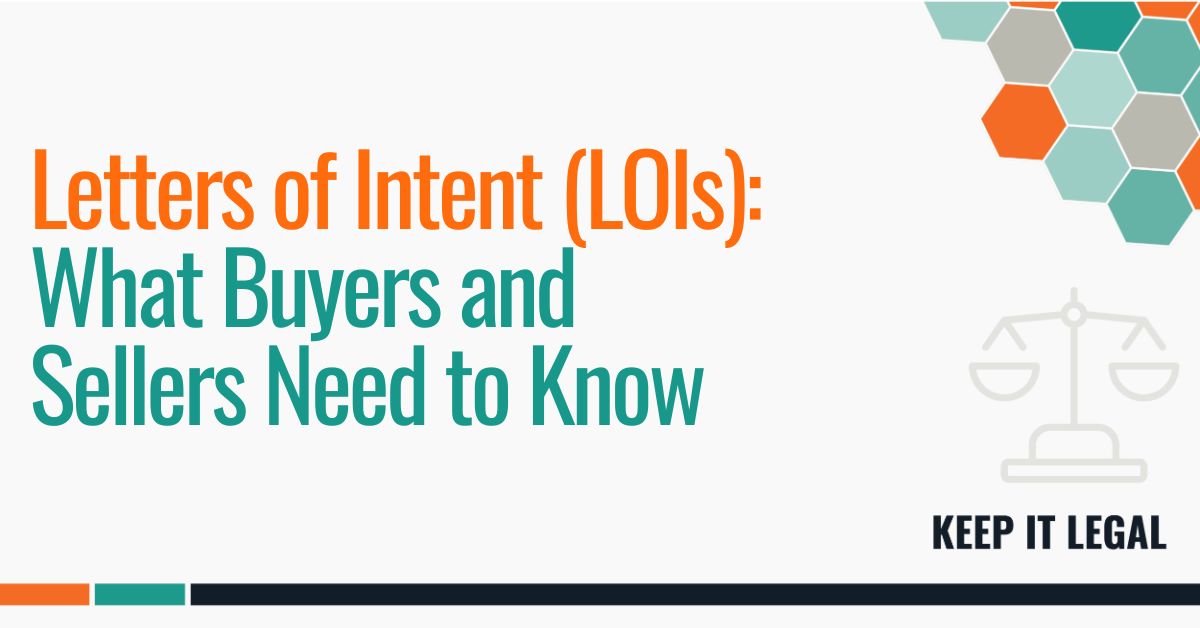Whether you’re looking to sell your business or acquire a new one, the letter of intent (LOI) is a critical early step in the transaction process. This non-binding document lays the groundwork for the deal, outlining the key terms and conditions that both parties agree to before proceeding to more intensive due diligence and negotiations.
From the purchase price and financing structure to contingencies and exclusivity periods, the LOI serves as a roadmap for the final purchase agreement. It’s an essential tool for ensuring both the buyer and seller are aligned on the essential elements of the deal. Transaction based-legal advice can also be an important part of the process.
Some key elements to focus on when reviewing or drafting an LOI include:
Business Purchase vs. Asset Purchase: Will the buyer be purchasing the whole business (such as a corporation or LLC), or some or all of the assets of the business? What about the liabilities of the business – will those go to the buyer along with the sale?
Purchase Price and Structure: The LOI will typically specify the total purchase price, as well as how it will be paid (cash, stock, earnouts, etc.). Will the buyer be paying in cash? Will the seller be financing all or part of the purchase price? Could the purchase price change based on the due diligence process?
Contingencies and Conditions: Outline any conditions the parties must meet before closing, such as securing financing, completing due diligence, or obtaining necessary approvals. Ensure these terms are reasonable.
Exclusivity Period: Many LOIs include a period of exclusivity, during which the seller will agree not to entertain other offers. Sellers should be cautious about granting lengthy exclusivity, as it can limit their negotiating leverage.
Confidentiality and Non-Compete Clauses: The LOI will likely contain provisions restricting the sharing of sensitive information or prohibiting competition post-sale.
Transition Assistance and Consulting: Will the seller assist with the transition of the business after the sale closes? If so, how, and for how long? Will the seller become an employee of the business or sign a consulting agreement?
Termination and Break-Up Fees: Understand what events could trigger the termination of the LOI, as well as any penalties or fees associated with walking away from the deal.
Earnest Money Deposit: This is a sum of money, typically ranging from 1-10% of the total purchase price (although these numbers vary widely), that the buyer will deposit upon execution of the LOI as a show of good faith and to secure their commitment to the transaction.
Not every LOI includes an earnest money deposit. For sellers, an earnest money deposit can provide valuable reassurance that the buyer is serious about the deal. Buyers, on the other hand, will want to carefully consider the appropriate earnest money amount. Too little may not be enough to give the seller confidence, while too much could tie up a significant portion of your capital during due diligence. The goal is to find a balance that demonstrates commitment without being overly burdensome. An attorney with expertise in transaction-based law can provide essential guidance on these types of points.
Regardless of which side of the transaction you’re on, the earnest money deposit should be clearly outlined in the LOI, including the specific conditions under which it would be refunded or applied towards the final purchase price.
Approaching the letter of intent process with a clear understanding of your goals and priorities is essential. If you have questions about an LOI, feel free to contact me.


